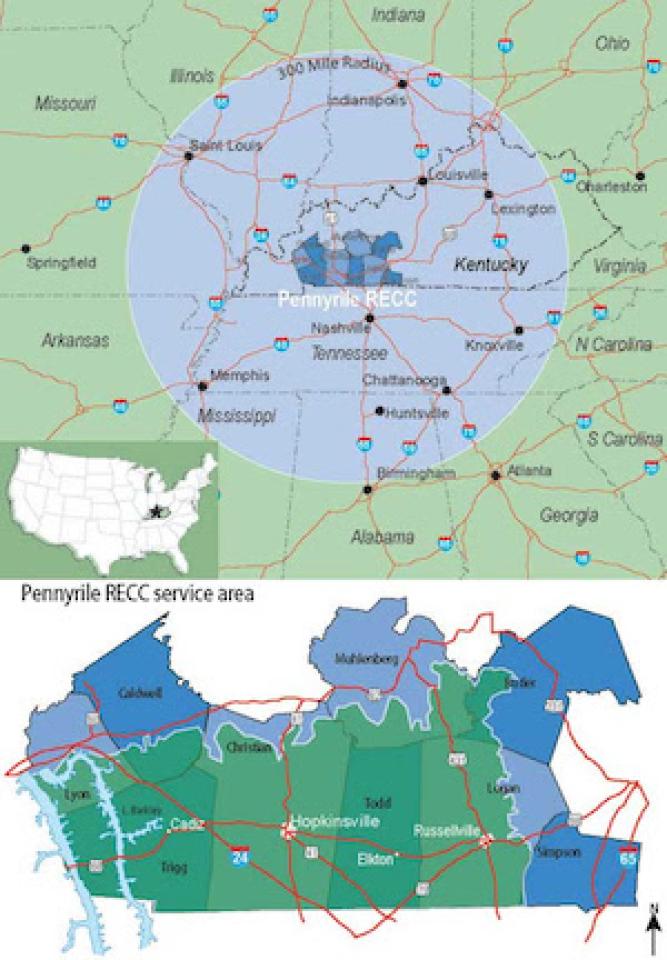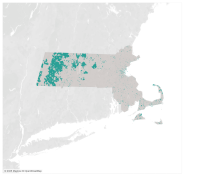
Once known as the center of bowling ball manufacturing, producing 60 percent of the world’s bowling balls, today Hopkinsville, KY (pop. 31,580) is on the verge of becoming a kingpin in a whole different lane: producing gig-speed broadband.
A municipal utility currently offering fiber Internet access to the residents of Hopkinsville, Hopkinsville Electric System (HES) is joining forces with Pennyrile Electric Cooperative to extend fiber-to-the-home Internet service to as many homes as possible in Pennyrile Electric’s service territory in southwestern Kentucky, starting with Christian, Trigg, and Todd Counties.
The three counties will contribute approximately $17 million of American Rescue Plan Act funds, while HES and Pennyrile will use a combination of state and federal grants and loans to contribute a 100 percent match for the $34 million project. When network construction is complete, it is expected to pass 28,000 households in the tri-county region.
Scoring Big in Public Partnership
While HES EnergyNet connected its first household in 2016, the utility has been utilizing the power of fiber-optic broadband for decades.
HES started as a municipal electric utility nearly 80 years ago, but in 1998, the board of directors decided to turn to fiber to connect its substations. By 1999, HES was offering fiber-fed broadband services to local businesses, industries, and city and county agencies through its ISP, EnergyNet.
In November 2018, HES EnergyNet announced it had plans to bring gigabit speeds to every address in Hopkinsville. Since then, the network has grown to serve more than 12,000 residents and businesses.
As HES was putting its fiber network to use, Pennyrile Electric reached out to its future partner and presented the idea to continue building fiber out into the surrounding rural areas. Pennyrile Electric has members across nine counties and had been getting numerous calls from co-op members asking whether or not the cooperative would get into the broadband business.
Jeff Hurd, the General Manager of HES EnergyNet, told ILSR in a recent interview he was excited at the prospect of connecting more homes in the area.
Over the next year, the two organizations met several times with attorneys, hammering out the logistics of how the partnership would work. Ultimately, they decided it made the most sense for Pennyrile to focus on installing fiber and handling the drops to households, while HES would lease the fiber, use their technical expertise to light up and operate the network, and also take care of customer service and provide routers.
“We kind of leveraged both of our strengths together and started down that path,” Hurd said.
Over the next few years, the two utilities worked together to launch pilot projects in Elkton in Todd County and in Cadiz which is in Trigg County. By November 2020, the pilot project in Cadiz was successful, leading them to announce a plan to bring 1 Gbps symmetrical service to every resident in the county.
“Reliability is so important. We feel fiber-to-the-home won’t just take care of them today, but we hope (decades to come),” Hurd said. “There’s nothing that compares with direct fiber-to-the-home.”
More Communities to Come
Other counties are following Christian, Trigg, and Todd in committing their own Rescue Plan funds to this collaboration. Hurd described how all nine counties in Pennyrile’s service territory came together to decide what to do with their ARPA funds.
Like many other communities, the pandemic made the need for better broadband crystal clear. Remote schooling, work from home, and telehealth services, quickly became top priorities for many local officials, steering the conversation toward broadband investment and supporting the efforts of HES and Pennyrile to bring fiber connectivity to the residents and businesses across all nine counties. If the partnership were to successfully cover all of Pennyrile’s service territory, it would bring FTTH to nearly 50,000 households.

In June 2021, Christian County announced it would commit $13 million in federal and state grants to help build countywide FTTH over the next five years.
“This is a first step in a much larger plan to bring high-speed Internet access to all our members similar to the way Pennyrile Electric brought rural electricity to its members 84 years ago”. President & CEO of Pennyrile Electric, Alan Gates said in a press release. “The monies allocated through this joint effort with Christian County Fiscal Court allow Pennyrile Electric to move forward with the project, while preserving a business model that protects the integrity of the electric side of our business.”
Both Trigg and Todd counties, with fiber pilot projects already underway in those communities, wanted HES EnergyNet to expand the network into the more remote regions of their counties, and contributed another $2 million each in ARPA funding.
Together Pennyrile and HES are contributing a 100 percent match to what the counties are throwing in, bringing the total project funds to $34 million.
“We are applying for loans through Kentucky League of Cities and other state loan/bonding agencies. I think PRECC would go through RUS ( Rural Utilities Service) or electric cooperative focused banks,” Hurd said. “We are also going to pursue broadband grants that may come through the federal or state governments.”
Hurd said they are calling this phase one because they won’t be able to connect every household in all three counties, but plan to build out as much as they can with the money they have on hand.
“Time is of the essence,” Hurd said. “Getting not only materials, but contractors to work...we knew the longer you wait, the further down the list you get.”
Right now, they are in the midst of the planning and design phase but hope to have boots on the ground to start construction by 2022. Ultimately, the project involves deploying 2,500 miles of fiber, and hopes to reach a 40 percent take rate.
Meanwhile, other counties in the region are signing up for the network to be extended into their communities as well. On October 6th, the Caldwell County Fiscal Court approved $1 million in ARPA funds to go toward a broadband service agreement with Pennyrile and HES.
Eventually, they want to cover all of Pennyrile’s membership across nine counties.
“Between us and Pennyrile, being the local entity, we’re the best ones to know what the local needs are,” Hurd said. “I think what we’re doing is unique between the two utilities sharing resources and then on top of that having the counties’ fiscal courts and magistrates involved. When you’re taking on a project of this magnitude … it’s got to be a cooperative or group effort between all of us.”







